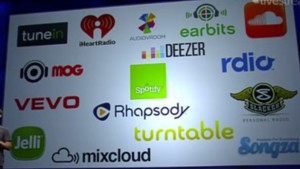I collected the survey results to see how potential users view our potential service. This provided us with information that informed the development of our site. The results are summarised below. So far our total response is 94 though only 32 people have completed the survey. You can find the survey here.
Question 1.1 : Age Group
Ages vary between 16 to over 30 though, more opinions of teenagers would have given a better balance to the survey. This survey may reflect the opinions of adults.
Question 1.2 : Gender
The balance between men and women is ideal. the survey may reflect unbiased opinions at least from view point of gender. This is useful information as we would like to provide information on the gender mix at events which is useful to party producers but also to users who attend the event, as this sometimes affects the decision to attend, especially for young people. Think Ladies Free Night!
Question 1.3 : What is your country of origin?
The survey consists of 10 countries. Although those variety will give us international viewpoints, there is no English origin. Although the web site will be implemented in UK, this survey may not reflect the opinions of domestic users, but reflect international views of users living in UK.
Question 1.4 : How often do you attend concerts/parties?
The average times those surveyed attended concerts/parties is 6 or less. The potential users of the site will be those attending parties at least “1 or more times per month”, which is 9 out of 32. although it is assumable almost everyone will listen to some music, attending music events are different from just listening to music.
Question 1.5 : How do you access music? Select all that apply.
This is a multiple choice question and people could tick boxes more than once. As expected YouTube is used by 1/3 of people. Highlighting the importance of not just music but video. 40% of people use some kind of downloading service which is a mainstream way of accessing to music today. The ability for people to add their YouTube Videos to the site will be useful as well as the ability for them to upload videos directly from their mobile. Though ensuring copyright is adhered too will be problematic.
Question 1.6 : Do you find these services satisfactory?
It looks like almost all have no problem with the way they access music, there are only two opinions about previous tools. “it doesn’t help me to discover good songs. It only features and advertises popular songs not the music of my taste.” and “can’t download music and always my favourite videos are erased.” Those are also complaints on the inability to customising music by their own taste. By giving freedom of selection of music taste on miXXerS, we may attract many potential users.
Question 1.7 : How do you discover new music? Select all that apply.
Here we enjoy variety of answers as it is also multiple choices. Finding new music from social media gained 20%, which is comparatively a rather large share of replies. There is enough potential to enlarge this share by creating a useful site. We also can add people answering “By going to concerts operas.” if we succeed to take them to our site by providing enough concert information. Other reply “Blogs” could potentially be included into our site.
Question 1.8 : Do you find these services satisfactory?
Written answers are “discovering new music is always difficult unless you have friends who knows a lot about the music.” “Because I still find it hard to find out about good new/ unknown artists” and “It would be nice to have a forum that could make new and innovative music more accessible instead of being lost in the clutter”. This sounds like finding new music is not easy since existing media may provide unfiltered information of new songs only. People need to have customized information which our site may provide. It seems that users are also constantly searching for new artists and new music, so being able to more easily have access to this via the miXXers site would be important. Connecting the dots between music and musical events will be an important component for this and so we believe miXXerS is on the right track.
Question 1.9 : Would you consider using a service that combines the following:
Being able to listen to new and existing music online,
Connecting with musicians and DJs and,
Provision of information about their upcoming events,
Connecting with friends and people with similar music/event taste?
It is nice that almost 80% people agreed to use the service such that our site will provide.
Question 1.10 : What features would you suggest for such an online service?
The following are replies.
- Real-time
- Music-oriented social media, like Instagram as being the picture/photo-oriented one.
- Less public social connections but more private social connection
if my favourite musician will come to my area, I d like to know that asap to get a ticket. Maybe they should send me an email of notification for events in a particular area. - An online community or forum which show the different genres and artistes for ease of searching. The community would give people a stronger reason to stay connected.
- Try before you buy
- The tracks, live chat with artistes and dJs as well other fans.
- Short impression of the atmosphere, artist and their music. In a short film or so, that can experience right away, and get in the mood. And then book with one clic.
- music, gossip, promotion
- better sound quality, longer duration of watching/listening youtube.
- Spotify, Facebook
- Unsure. But an ability to pay and receive music instantly or to trial listening before buying would be good.
- Isn’t this similar to Soundcloud and Spotify? It does not seem like a new service.
- Suggested bands/artists based on your own tastes
- User friendly interface, compatibility with other social networking sites.
- Suggesting similar artists according to the music gender
- Come out with lyrics
- Advertise on YouTube, Facebook and in the MV.
- The music sound is clear and high quality
- Posts on the inspiration behind musical pieces; feature song or artist of the day
- Geared towards getting to know the individual behind the music
- Music being played on and on with different music generation.
- Ability to download
By examining those 22 answers to 6 categories, it is said that there are two major categories people may concern; “social media function” and “music quality”. As for social media function, people needs other factors to their music site such as “more private”. they prefer a friendly site even it is for music. Another aspect, “music quality” is also important. they concern quality of music when they listen/download. The third popular category “customized music taste” includes “Suggesting similar artists,” “posts on the inspiration behind musical piece” that are not officially provided. Those answers will will influence the future development of our site. The music and social site required now should cover those three factors.
- Customized music taste
- Faster flow of
- information on musicians
- Better music quality
- Social media function
- Better usability
Based on the results of the survey we will have to continually improve on privacy to ensure the reputation of the site maintains in tack. We will also have to be innovative and explore new ways to integrate the musical experience both online and offline at events, in a genuinely social and integrated and mobile way. We would also like to undertake further research to help us continually improve the service and successfully evolve.

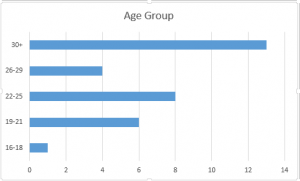
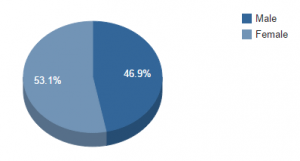
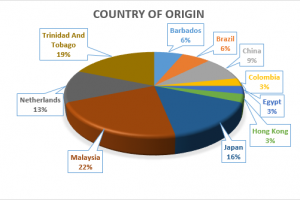
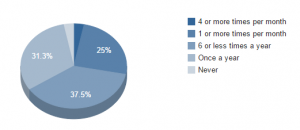
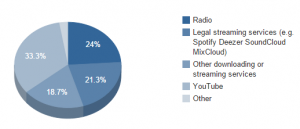
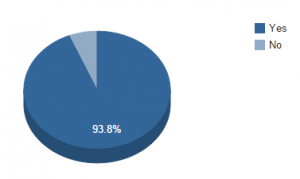
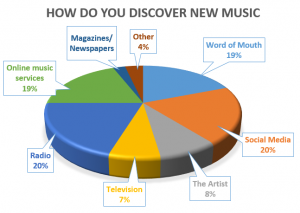
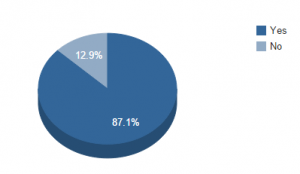
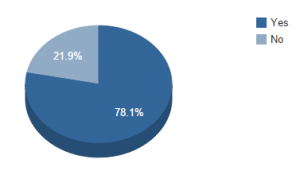
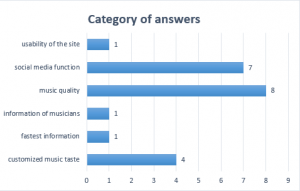
 Given young people are our chosen demographic focus one suggested feature is advice on what music is useful for studying. However, miXXerS is specifically for people who go to parties. While the idea came up it is quite a divergence from the main aim of the site which targets DJs, party/concert goers and musicians and party producers/promoters. Given we are a team of all students that like music we are getting our music on as we work on this project.
Given young people are our chosen demographic focus one suggested feature is advice on what music is useful for studying. However, miXXerS is specifically for people who go to parties. While the idea came up it is quite a divergence from the main aim of the site which targets DJs, party/concert goers and musicians and party producers/promoters. Given we are a team of all students that like music we are getting our music on as we work on this project.
